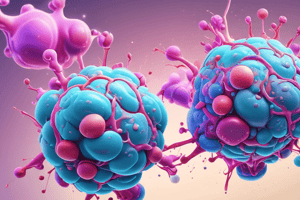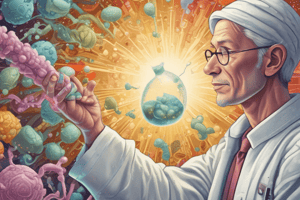Podcast
Questions and Answers
What is the main goal of antimicrobial chemotherapy?
What is the main goal of antimicrobial chemotherapy?
- To promote the synthesis of peptidoglycan in bacteria
- To prevent all types of microbial infections
- To enhance the growth of host cells
- To destroy infectious agents without harming the host's cells (correct)
Which statement accurately describes antibiotics?
Which statement accurately describes antibiotics?
- They are produced by microorganisms and can inhibit or kill other microbes (correct)
- They must be taken intravenously to be effective
- They can only destroy gram-positive bacteria
- They are substances that harm both microbes and host cells
How do polymyxins affect bacterial cells?
How do polymyxins affect bacterial cells?
- They interact with membrane phospholipids causing leakage of cellular components (correct)
- They interfere with nucleic acid synthesis
- They block protein synthesis during replication
- They inhibit the synthesis of peptidoglycan
What is a characteristic of Penicillin G?
What is a characteristic of Penicillin G?
What function does Rifampin serve in antimicrobial treatment?
What function does Rifampin serve in antimicrobial treatment?
Flashcards
Antibiotic
Antibiotic
A substance naturally produced by microorganisms that can kill or inhibit other microorganisms.
Selective Toxicity
Selective Toxicity
The ability of a drug to harm infectious microbes without harming the host's cells.
Peptidoglycan
Peptidoglycan
A rigid structural molecule found in bacterial cell walls providing protection against hypotonic environments.
Polymyxins (antibiotic)
Polymyxins (antibiotic)
Signup and view all the flashcards
Rifampin (antibiotic)
Rifampin (antibiotic)
Signup and view all the flashcards
Study Notes
Antimicrobial Chemotherapy
- The goal is simple: administer a drug to destroy the infectious agent without harming the host cells. This is a difficult goal to achieve.
- Antibiotics are substances produced by microorganisms that inhibit or destroy other microorganisms.
- Drugs should be selectively toxic—killing or inhibiting the growth of microbes without harming the host.
Cell Wall Structure and Antibiotics
- Many bacterial cell walls contain peptidoglycan, which protects the cell from hypotonic environments.
- Polymyxins interact with membrane phospholipids, causing protein and nucleic acid leakage, particularly in gram-negative bacteria. Daptomycin is selective for gram-positive bacteria.
Antibiotic Mechanisms
- Antimicrobial drugs can interfere with nucleic acid synthesis, replication, or transcription.
- Many drugs inhibit protein synthesis by interacting with the ribosome-mRNA complex.
- Penicillin G is a narrow-spectrum antibiotic.
- Polymyxins are a mixture of polypeptides, effective against gram-negative bacteria but toxic to kidneys.
- Rifampin disrupts nucleic acids by blocking RNA polymerase.
- Tetracyclines are broad-spectrum antibiotics with a complex 4-ring structure.
Studying That Suits You
Use AI to generate personalized quizzes and flashcards to suit your learning preferences.




